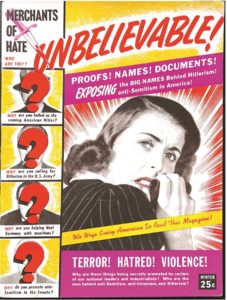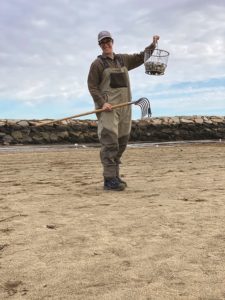Rachel Maddow’s hit podcast Ultra is a tightly crafted work of historical research, a fable for our current fascism-tinged political landscape, and a love letter to the Library of Congress. It is also a compelling true story that at times seems almost unbelievable.

Ultra examines the rise of pro-Nazi sedition plots in the United States before and during the Second World War and the noble but thwarted Dept. of Justice investigation that followed. Even some scholars who consulted on the podcast were unaware of the full extent of the danger to American democracy that Maddow and her producers uncovered. Ultra’s narrative synthesis fills a gap in the historical record.
Maddow, who began her career in radio before moving to TV journalism, says that podcasts are uniquely suited to producing emotional responses. “You can’t fatten it out with visual distractions,” she explains in an interview with the Independent. “It’s got a purity to it that I really enjoy.”
She initially set out to research the 1940s origins of Holocaust denial and understand how the phenomenon was “deliberately constructed as a falsehood for a reason.” But along the way she encountered the cast of characters implicated in a group sedition trial in 1944 who were eventually acquitted and “melted back into the sauce of the United States,” as she puts it. Working with producer Mike Yarvitz, Maddow decided that this back story was too important to truncate.
Much of the attention surrounding the podcast has focused on its uncanny resonances with the Jan. 6, 2021 Capitol riot and the sweeping case against its participants that the current Justice Dept. has built over the past two years. “I do think it’s helpful to realize what in our current dilemma is actually unprecedented and what we’ve faced before,” says Maddow.
Ultra begins with what was then the deadliest aviation disaster in U.S. history: the Pennsylvania Central Airlines Trip 19 crash on Aug. 31, 1940. On the plane was Minnesota Sen. Ernest Lundeen — along with two FBI agents and a Justice Dept. prosecutor who had been investigating the senator’s ties to a top Nazi propaganda agent named George Sylvester Viereck.
With equal parts fascination and horror, Maddow reveals that Viereck had infiltrated the U.S. government and was deploying sitting senators and Congressmen — many of whom were tied to the nativist and isolationist America First Committee — to inject Hitler’s talking points into the minds of millions of unsuspecting Americans.
The podcast jumps back in time to cover some of the pro-fascist and anti-Semitic movements that gained traction in the U.S. in the 1930s, from William Dudley Pelley’s Silver Shirts (who were named after the Nazi-style uniforms they adopted) to the militias of Father Charles Coughlin’s Christian Front. The narrative culminates in the circus-like sedition trial in 1944, a sprawling attempt by the Justice Dept. to prosecute dozens of right-wing advocates of an alleged Nazi-backed coup plot. It failed to obtain convictions but succeeded in creating a public scandal.
“Part of the plot is asking what the public knew and how they reacted,” Maddow says. It was Yarvitz’s idea to begin with the plane crash, which happened just two weeks after the publication of the first newspaper story that hinted at the pro-Nazi scheme in Congress.
Journalism looms large in the narrative, both in the exposés published at the time and as a meta-level source of historical illumination in the present. Maddow says that the reporters who covered the story “gave us a record that we can use today to understand both what the bad guys were doing and what the most effective way was to communicate that to the public.”

By and large, Maddow says, many media figures “went out of their way to give these members of Congress the benefit of the doubt,” including in 1939 when New York Rep. Hamilton Fish III visited Europe as a guest of Joachim von Ribbentrop, minister of foreign affairs for the Nazi government. Fish had also headlined a pro-Nazi rally in Madison Square Garden the year before.
Maddow’s archival research also revealed an unexpected tool in the anti-fascist arsenal: pamphlets that were sold at newsstands and featured “over the top B movie-style illustration and exclamation points everywhere,” as she describes them. They were accessible by design, and effective in warning the public about anti-Semitic and pro-fascist threats in the streets and in the halls of government. Producer Kelsey Desiderio’s discoveries of contemporary high-quality newscast recordings in the Library of Congress archives was key to making the project possible as a podcast. Maddow’s affection for the library is apparent: “It’s a beautiful historical set of crown jewels that I want more people to have romantic feelings about,” she says.
After hosting The Rachel Maddow Show on MSNBC five nights a week since 2008, Maddow shifted to producing a single weekly show in May 2022, which created room in her schedule to work on longform projects like Ultra. When the podcast was completed, Maddow says, she immediately produced a 12-page single-spaced document of everything that was left out during editing. That material will be included in a book she is now working on, which will also allow her to introduce additional characters — including well-known figures like Charles Lindbergh and Henry Ford — whose inclusion in the podcast, she feared, would have distracted from the central narrative. Steven Spielberg has already optioned the film rights.
Despite the well-documented struggles of modern journalism, Maddow believes that today’s fourth estate is thriving. “Certainly, we have our problems,” she says. “But I think this will be seen as a time when the professional American journalistic corps did good work for the country and told tales that people in power didn’t want told. And that’s the test, right?”
She also believes that strong local newspapers can serve as a bulwark against the creep of fascism and bigotry. “Being able to tell detailed, episodic stories that continue every week knits everybody into their community,” Maddow says. “And when that feeling is created, the angels of democracy sing.”
The eighth and final episode of Ultra was released in November, and Maddow says she still tosses and turns over some of her editorial choices. But the positive response has been undeniable.
“I’m really glad it has landed with people in a resonant and helpful way in terms of the news today,” she says. “Overall, despite my nitpicking, I am proud of it.”



